Related Research Articles

Lauryn Noelle Hill is an American rapper, singer, songwriter, record producer, and actress. She is regarded as one of the greatest rappers of all time, as well as one of the most influential musicians of her generation. She is often credited for breaking barriers for female rappers, popularizing melodic rap, and pioneering neo soul for mainstream audiences. In addition to being named one of the 50 Great Voices by NPR, Hill was listed as one of the 200 Greatest Singers of All Time by Rolling Stone. In 2015, she was ranked as the greatest female rapper by Billboard. Her other accolades include eight Grammy Awards—the most for any female rapper.

Germaine Williams, better known by his stage name Canibus, is a Jamaican-American rapper. He gained fame in the 1990s for his ability to freestyle, and released his debut album Can-I-Bus in 1998. Canibus has released 13 solo studio albums, as well as multiple collaboration albums and EPs with other rappers as a member of the Four Horsemen, Refugee Camp All-Stars, Sharpshooterz, Cloak N Dagga, the Undergods and one-half of T.H.E.M.

Fugees are an American hip hop trio formed in 1990 in South Orange, New Jersey. Deriving its name from a shortening of the word "refugees", the group consists of Wyclef Jean, Pras Michel, and Lauryn Hill. The group rose to prominence in the mid-1990s for their pioneering blend of reggae, R&B, funk and hip hop, which eschewed gangsta rap and made them one of the most significant alternative hip hop acts. They occasionally rapped in Haitian Creole, and were one of the first hip hop bands to incorporate live instrumentation during their performances, along with the Roots.
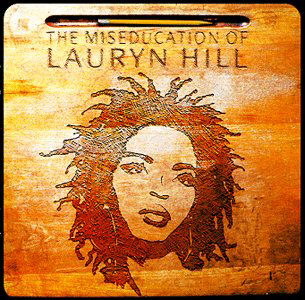
The Miseducation of Lauryn Hill is the only solo studio album by American singer-songwriter and rapper Lauryn Hill. It was released on August 25, 1998, by Ruffhouse Records and Columbia Records. The Miseducation of Lauryn Hill is a neo soul and R&B album with some songs based in hip hop soul and reggae. Its lyrics touch upon Hill's pregnancy and the turmoil within her former group the Fugees, along with themes of love and God. The album's title was inspired by the film and autobiographical novel The Education of Sonny Carson, and Carter G. Woodson's The Mis-Education of the Negro.

Nel Ust Wyclef Jean is a Haitian rapper, singer, record producer and multi-instrumentalist. At the age of nine, Jean and his family immigrated to Northeastern United States. He formed the New Jersey-based hip hop trio Fugees in 1990 with fellow musicians Lauryn Hill and Pras Michel, for which Jean served as lead guitarist and producer. The group released the albums Blunted on Reality (1994) and The Score (1996), the latter became one of the best-selling albums of all time. Following their success, Jean released his debut solo album, Wyclef Jean Presents The Carnival (1997), which yielded the Billboard Hot 100-top ten single "Gone till November".

Prakazrel Samuel Michel, known professionally as Pras, is an American rapper. He is best known as a member of the hip hop group Fugees, which he formed with fellow New Jerseyans Wyclef Jean and Lauryn Hill in 1990. As a solo act, he signed with Columbia Records in 1996 and earned two top 40 hits on the Billboard Hot 100 with his 1997 single "Avenues" and his Grammy Award-nominated 1998 single, "Ghetto Supastar ". The latter was released for the Warren Beatty film Bulworth (1998), while both preceded the release of his debut studio album, Ghetto Supastar (1998). He also collaborated with Jean and rock band Queen on the 1998 remix of "Another One Bites the Dust", which reached the top five on the UK Singles Chart. In 2017, he won a Daytime Emmy Award for Outstanding Digital Daytime Drama Series for his work as a producer on the web series The Bay.

The Score is the second and final studio album by the hip hop trio Fugees, released worldwide on February 13, 1996, on Columbia Records. The album features a wide range of samples and instrumentation, with many aspects of alternative hip hop that would come to dominate the hip-hop music scene in the mid- to late-1990s. Primarily, The Score's production was handled by Fugees themselves, Jerry Duplessis and Warren Riker, with additional production from Salaam Remi, John Forté, Diamond D, and Shawn King. The album's guest verses are from Outsidaz members Rah Digga, Young Zee, and Pacewon, as well as John Forté, and Diamond D. Most versions of the album feature four bonus tracks, including three remixes of "Fu-Gee-La", and a short acoustic Wyclef Jean solo track entitled "Mista Mista".

Wyclef Jean Presents The Carnival, also known simply as The Carnival, is the debut studio album released by Haitian hip hop musician Wyclef Jean. The album was released on 24 June 1997. Wyclef Jean also served as the album's executive producer. The album features guest appearances from Celia Cruz and The Neville Brothers and multiple appearances from Jean's former Fugees bandmates, Lauryn Hill and Pras.
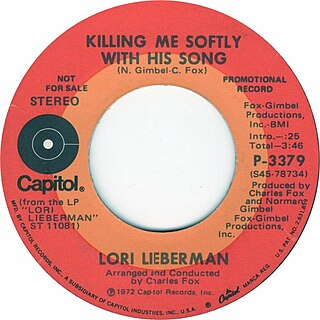
"Killing Me Softly with His Song" is a song composed by Charles Fox with lyrics by Norman Gimbel. The lyrics were written in collaboration with Lori Lieberman after she was inspired by a Don McLean performance in late 1971. Denied writing credit by Fox and Gimbel, Lieberman released her version of the song in 1972, but it did not chart. The song has been covered by many other artists.
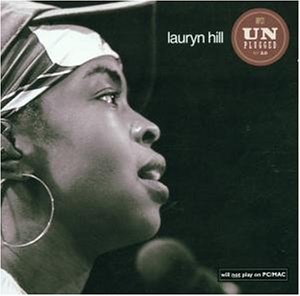
MTV Unplugged No. 2.0 is a live album by American singer-songwriter and rapper Lauryn Hill. The performance comes from her 2002 MTV Unplugged special recorded on July 21, 2001, at MTV Studios in Times Square, New York City. Hill abandoned the hip hop sounds of her debut album The Miseducation of Lauryn Hill (1998) in favor of folk and soul songs. It was recorded while she was pregnant with her third child YG Marley. The songs were written solely by Hill, who performed them unaccompanied by a live band, while playing an acoustic guitar. It features lyrics about religion, police brutality, mental health and abuse of authority, along with spoken interludes about her personal and artistic struggles.
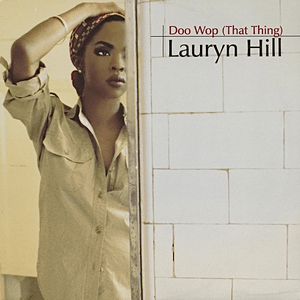
"Doo Wop (That Thing)" is a song by American recording artist Lauryn Hill for her debut solo studio album The Miseducation of Lauryn Hill (1998). It was written and produced by Hill. The song was released as her solo debut and lead single from The Miseducation of Lauryn Hill on August 10, 1998, by Ruffhouse Records and Columbia Records. No commercial release was originally intended for the single in the US, but limited-quantity physical formats were issued two months later, on October 27.

"Hips Don't Lie" is a song by Colombian singer-songwriter Shakira, featuring Haitian rapper Wyclef Jean, released by Epic Records in 2006 as the second single from Shakira's seventh studio album, Oral Fixation, Vol. 2 (2005). Shakira and Jean wrote the lyrics and jointly composed the music with additional co-writing by Shakira's percussionist Archie Pena. The song was produced by Shakira and Jean with additional co-production by Jerry Duplessis. "Hips Don't Lie" is a reworking of Jean's earlier single "Dance Like This", therefore it features additional composing credits by Omar Alfanno, Duplessis, Luis Días, and LaTavia Parker. The song incorporates samples from "Amores Como el Nuestro" written by Alfanno, and "Carnaval " written by Días.

"Fu-Gee-La" is a song by American hip-hop trio, Fugees, released on December 13, 1995 by Ruffhouse Records, as the lead single from their second and final album, The Score (1996). Produced by Salaam Remi, it contains a sample of "If Loving You Is Wrong " by Ramsey Lewis, while its chorus contains an interpolation of "Ooo La La La" by Teena Marie. Immediately following this is a sample of "Shakiyla (JRH)" by the Poor Righteous Teachers.

"Ready or Not" is a song by American hip-hop group Fugees, from their second studio album, The Score (1996). The song contains a sample of "Boadicea" (1987) by Irish singer Enya, and its chorus is based on "Ready or Not Here I Come " by the Delfonics.

"We Trying to Stay Alive" is the first single released from Wyclef Jean's debut solo album, The Carnival. The song features raps by John Forté and Pras and samples the 1977 Bee Gees hit "Stayin' Alive" and Audio Two's "Top Billin'" (1987). The video version also contains an interpolation of the main melody of "Trans-Europe Express" by "Kraftwerk". In the US, it reached number 45 on the Billboard Hot 100 chart. Additionally, it reached number three on the Hot Rap Songs chart and number 14 on the Hot R&B/Hip-Hop Songs chart. The track reached number 87 on VH1's "100 Greatest Hip-Hop Songs of All Time".
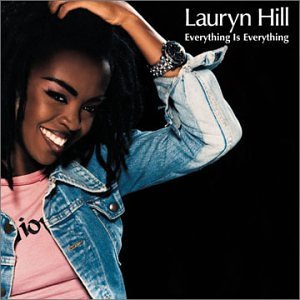
"Everything Is Everything" is a song recorded by American recording artist Lauryn Hill for her debut solo studio album The Miseducation of Lauryn Hill (1998). It was written by Hill and Johari Newton, and produced by Hill. During the recording sessions, Hill wanted to write about injustice and struggles amongst youth communities in inner city areas of the United States. The song contains R&B, 1960s soul, and hip hop influences. It marked the first commercial appearance of singer and pianist John Legend, who was 19 years old when he played the piano on the song. The song was released as the third and final single from The Miseducation of Lauryn Hill on May 3, 1999, by Ruffhouse Records and Columbia Records.
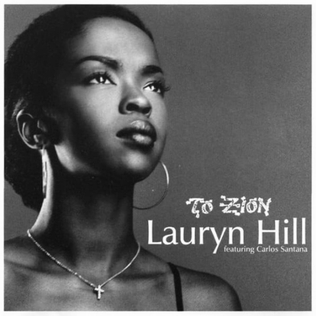
"To Zion" is a song recorded by American rapper and singer Lauryn Hill for her debut solo studio album The Miseducation of Lauryn Hill (1998). It was written and produced by Hill herself, while Che Pope received a co-production credit under his pseudonym Che Guevara. Featuring American guitarist Carlos Santana, "To Zion" is an acoustic Spanish guitar-driven hip hop track. Lyrically, it is a tribute to Hill's oldest son Zion David Marley, to whom she gave birth in 1997, during her relationship with Rohan Marley.
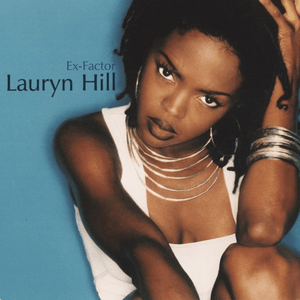
"Ex-Factor" is a song by American recording artist Lauryn Hill for her debut solo studio album The Miseducation of Lauryn Hill (1998). Written and produced by Hill herself, it incorporates elements of R&B, neo soul and hip hop soul. The song features a sample of "Can It Be All So Simple" by Wu-Tang Clan. It has been claimed to be about Hill's former Fugees groupmate Wyclef Jean. The song was released as the second single from The Miseducation of Lauryn Hill on December 14, 1998, by Ruffhouse Records and Columbia Records.

Ms. G.O.A.T., an acronym for "Greatest Of All Time", is the debut mixtape by American rapper Lil' Kim. It was officially released on June 3, 2008 and was produced by Mister Cee and DJ Whoo Kid, DJs from New York City. The title references the 2000 album G.O.A.T. by American rapper LL Cool J.

"Rumble in the Jungle" is a song recorded for the 1996 documentary film When We Were Kings, which depicts the 1974 boxing match between Muhammad Ali and George Foreman that the song is named after: The Rumble in the Jungle. The song was written and performed by American hip hop group Fugees along with fellow hip hop artists A Tribe Called Quest, Busta Rhymes, and John Forté. Additional writers credited on the song are Benny Andersson, Björn Ulvaeus, Stig Anderson, and Chip Taylor since "Rumble in the Jungle" samples recordings written by them. The lyrics of the song focus mostly on Ali and his life, as well as the boxing match itself.
References
- ↑ "The 10 Best Sister Nancy "Bam Bam" Samples". OkayPlayer. Retrieved May 15, 2024.
- ↑ Weingarten, Christopher R. (August 25, 2018). "Flashback: See Lauryn Hill Perform Lush Version of 'Lost Ones' at MTV VMAs". Rolling Stone. Retrieved March 13, 2021.
- ↑ Gregoriadis, Linus (September 11, 1999). "MTV video awards Grammy winner Lauryn Hill dominates". The Guardian. ISSN 0261-3077 . Retrieved March 13, 2021.
- ↑ 1999 MTV Video Music Awards (1999) – IMDb , retrieved July 2, 2022
- ↑ "The 50 Best Rap Songs by Women". Complex. Retrieved March 25, 2021.
- ↑ "100 Greatest Hip-Hop Songs of All Time". Rolling Stone. June 2, 2017. Retrieved March 13, 2021.
- ↑ Kot, Greg (January 21, 1999). "Lauryn Hill: The Album of the Year". Rolling Stone. Retrieved March 13, 2021.
- ↑ Clerine, Alain (August 25, 2020). "This Day in Hip Hop: Lauryn Hill's 'Miseducation' inspires a generation - NYS Music" . Retrieved March 13, 2021.
- ↑ Sieczkowski, Cavan (September 18, 2012). "Why Wyclef Jean Says Lauryn Hill Affair Ruined The Fugees". HuffPost. Retrieved March 13, 2021.
- ↑ Touré; Touré (October 30, 2003). "The Mystery of Lauryn Hill". Rolling Stone. Retrieved March 13, 2021.
- ↑ "The 40 Biggest Hip-Hop Feuds". Complex. Retrieved March 13, 2021.
- ↑ "EXCLUSIVE: Wyclef: "911" Wasn't a Shot at Lauryn, Unsure if "Lost Ones" Was a Shot at Him". www.vladtv.com. Retrieved March 13, 2021.
- ↑ Bandini (October 15, 2016). "Pras Details Being Caught In The Middle Of Lauryn Hill & Wyclef's Problems (Video)". Ambrosia For Heads. Retrieved March 13, 2021.
- 1 2 Brown, Imani (August 24, 2018). "Lauryn Taught You: The Samples of 'The Miseducation'". The Boombox. Retrieved July 2, 2022.
- ↑ Glaysher, Scott (April 13, 2018). "20 of the Best Hip-Hop Samples of Lauryn Hill's Music - XXL". XXL Mag. Retrieved March 13, 2021.
- ↑ "H.E.R. Flips Lauryn Hill's "Lost Ones" On New Track "Lost Souls"". Genius. Retrieved March 13, 2021.
- ↑ "Watch Leslie Odom Jr. reveal some hidden hip hop references in 'Hamilton'". TODAY.com. Retrieved March 13, 2021.
- ↑ "Hamilton Soundtrack Guide: Every Broadway Song In Disney+'s Hamilfilm". ScreenRant. July 3, 2020. Retrieved July 2, 2022.
- ↑ "Jadakiss feat. Pharrell Williams's 'Knock Yourself Out' - Discover the Sample Source". WhoSampled. Retrieved July 2, 2022.
- ↑ Watkins (@GrouchyGreg), Grouchy Greg (January 14, 2008). "Lil' Kim: Ms. G.O.A.T. (Mixtape)". AllHipHop. Retrieved July 18, 2022.
- ↑ Robinson, Lisa. "Sam Smith, Nas, and Grimes Pick Their Top Five Songs of the Moment". Vanity Fair. Retrieved July 2, 2022.
- ↑ Feeney, Nolan (June 1, 2018). "The Next Generation of Lauryn Hill: 16 Artists on Their Favorite 'Miseducation' Songs". Billboard. Retrieved July 2, 2022.
- ↑ ""Dissect" MS1E2 - Dissecting "Lost Ones" + "Ex Factor" by Lauryn Hill (Podcast Episode 2018)". IMDb. Retrieved July 2, 2022.
- ↑ "Rico Nasty and the Importance of Black Women's Anger in Rap". pitchfork.com. July 15, 2019. Retrieved July 2, 2022.
- ↑ "The 20 best hip hop diss tracks of the '90s". Mixmag. Retrieved March 13, 2021.
- ↑ published, Fred Garratt-Stanley (January 2, 2024). "10 of the most explosive diss tracks in musical history, from Biggie Smalls to Bob Dylan". MusicRadar. Retrieved May 15, 2024.
- ↑ Mo, Reasy. "My Recap of XXL's 250 Greatest Hip-Hop Songs 1990-1999 Part 2" . Retrieved March 13, 2021.
- ↑ Smith, Danyel (March 11, 2021). "Chapter 6: The Diss-Education of Lauryn Hill, Feat. Angela Yee and MC Lyte". The Ringer. Retrieved March 13, 2021.
- ↑ Barker, Emily (July 29, 2015). "19 Of The Fiercest Diss Tracks In Hip-Hop, Rock And Pop History". NME. Retrieved March 13, 2021.
- ↑ Complex. "50 Best Hip-Hop Diss Songs of All Time". Complex. Retrieved May 15, 2024.
- ↑ MTV News Staff. "Rap's Top 10 Diss Songs". MTV News. Retrieved March 13, 2021.
- ↑ "John Lennon, 2Pac, Arctic Monkeys and the history of insult songs". The Herald. January 8, 2023. Retrieved May 15, 2024.
- ↑ "Furious, funny and potentially fatal: hip-hop's 20 greatest diss tracks – ranked! | Music | The Guardian". amp.theguardian.com. Retrieved May 15, 2024.
- ↑ https://hiphopdx.com, HipHopDX- (May 14, 2024). "100 Greatest Diss Songs In Hip Hop History: Ranked". HipHopDX. Retrieved May 15, 2024.
{{cite web}}: External link in|last= - ↑ "The greatest hip-hop songs of all time – who voted". www.bbc.com. Retrieved March 13, 2021.
- ↑ McNeilly, Claudia McNeillyClaudia McNeillyContributing Authors: Claudia (March 30, 2020). "60 Essential Songs From Women in Hip-Hop". XXL Mag. Retrieved May 22, 2022.
- ↑ "The Five Best Hip-Hop Songs - TIME". May 22, 2022. Archived from the original on May 22, 2022. Retrieved May 22, 2022.
- ↑ "Nicki Minaj, Lauryn Hill, Lil Kim—the Top 10 Verses by Female Rappers". May 22, 2022. Archived from the original on May 22, 2022. Retrieved May 22, 2022.
- ↑ "Lauryn Hill's First Verse - Image 8 from The 10 Best Rap Verses of All Time | BET". BET . May 22, 2022. Archived from the original on May 22, 2022. Retrieved May 22, 2022.
- ↑ Rindner, Grant (June 25, 2020). "50 Essential Hip-Hop Songs That Capture the Genre's History". Oprah Magazine. Retrieved March 13, 2021.
- ↑ "Lauryn Hill". Billboard. Retrieved March 13, 2021.